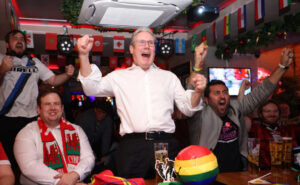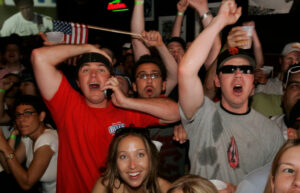When, in the autumn of 1963, Harold Macmillan resigned as Prime Minister, there was no formal mechanism in place for deciding who his replacement would be. Back then, the Conservative Party still prided itself in a self-selecting process — what would be later called “the magic circle” — where a leader would simply emerge based on discussions between the high ranking Tories.
In that battle to replace Macmillan, the big guns Rab Butler, Quintin Hailsham, and Reginald Maudling were all spoken about as successors. But nobody really knew who had the best chance and the public were left in the dark. Because in 1963, no high street bookmaker would lay odds on political events.
It was the legendary Ladbrokes odds compiler Ron Pollard who would change that. Sensing immense public interest in the outcome of the contest he advised his bosses to run a book on it to gain some added publicity for the bookmaker.
Prior to that, in the 1920s, political betting had been confined to city traders who would bet on “majorities” — what we now call spread betting — where seat totals would be calculated, and traders would buy/sell above or below the line.
At the 1931 election, speculators traded over £750,000 on the election and severely under-estimated the prospect of a Labour collapse. The losses of one punter led to a much-publicised court case when a trader refused to pay up, citing the Gaming Act as his defence. In the aftermath, election gambling was outlawed.
Yet, after the war, gambling became a huge part of everyday life for the public. Better job security, higher wages and more leisure time were all themes of the time. The rise of football pools, premium bonds and bingo offered working-class people an outside shot at a huge windfall. Viv Nicholson, a liquorice factory worker from Castleford, won £152,000 (equivalent to almost £5 million today) on the pools with the promise to “spend, spend, spend”.
Politicians, particularly on the Labour side, had feared the rise of gambling. Figures such as Ramsay MacDonald had described it in the Thirties as “a disease which spread downwards to the industrious poor from the idle rich”. But society was changing. In a speech in Dewsbury in 1956, Nye Bevan urged his Left-wing colleagues not to be “puritan” and that they should encourage people to “have a good time”. “I do not mind a man putting a shirt on a horse so long as he does not put someone else’s on.”
When it came to the 1963 contest, Pollard gained publicity from the media for offering the odds despite him pricing it completely wrong. As many commentators and journalists had assumed, he decided that Rab Butler was the clear frontrunner at 5/4. However, it was the 16/1 outsider Alec Douglas-Home who took out the prize in the end.
Not everybody was impressed by Pollard’s decision. In a highly hypocritical statement, the Left-wing Labour backbencher Ian Mikardo used a speech in Poplar to criticise Ladbrokes. ”It is a sad day for Britain when the bookmakers turn aside from horses and dogs to make a book on who is going to lead the nation”. He accused the Tories of “dragging the premiership down to the level of the ‘Donkey Derby’”.
Mikardo would radically change his view in the next decade as he became the semi-official Commons bookmaker, taking bets on political events for the rest of his career. Soon, politicians saw it as a chance to make a quick buck. Before the rise of online betting, if you went to the William Hill shop on Horseferry Road, the nearest one to the Commons, you would often find rouge MPs gambling on football, racing, golf or their own electoral prospects.
Others won big by backing themselves against the odds. The now-disgraced Liberal MP Clement Freud — who was investigated by the Met in 2016 for histroic child sexual abuse claims — was once notorious for being the shrewdest punter in Westminster when he was the candidate in the Isle of Ely by-election in 1973. Having begun as the 33/1 outsider, he managed to place £1,000 on himself — winning the equivalent of £340,000 in today’s money when he became the MP.
In the mainstream, however, political betting was seen as a fringe activity in contrast to the big money that bookies took on football and horse racing. By the Nineties, it was still seen as a good way for bookmakers to promote their brand in the serious pages of the newspapers and gain some free advertising.
In 1997 the press tracked down the Durham taxi driver who had, in 1983, placed a £10 bet on one of his passengers, a young Tony Blair one day becoming prime minister. Again, in 2010, William Hill reported that it stood to lose £1 million after it emerged they had laid bets to two students in 1996 — Justin Tomlinson and Chris Kelly — that one day they would become prime minister. Both became Conservative MPs, but only Tomlinson remains in with a shout of netting a £500,000 windfall.
In recent years though, political betting has become a serious business as the stakes have grown far higher. The emergence of more firms and markets, combined with the boom in online gambling, has created an increased interest.
During the Scottish Independence referendum, one punter staked £1 million on the outcome — winning £193,000 over the course of a few hours on election night. Then, in 2016, over £120 million was wagered on the Brexit referendum, while the dramatic Trump/Clinton US contest a few months later was adjudged to have been the biggest single betting event — barring the grand national — the UK has ever seen.
As of 2023, the industry is estimated to be worth over £14.3 billion and the big winners, beyond the bookmakers, are the Treasury who rake in huge tax revenues (how much). Denise, John and Peter Coates, the owners of bet365, were the third-highest taxpayers in the UK last year, according to the latest edition of the Sunday Times rich list.
With the 2024 election in full swing, the bookmakers are now readying themselves for what could be the biggest British election ever for punters. William Kedjanyi is the “man with a whiteboard” and Star Sports dedicated full-time politics guru who will be gunning across the country this month. “Political betting has now entered the mainstream,” Kedjanyi says. “Twenty years ago, it used to be just for political anoraks, but as there is more data and more polling companies, the public demand for a bet is increasing.”
Whereas the average sports punter doesn’t use data models to predict the outcome of an event, the political punters are more switched on to trends that are happening. These are, Kedjanyi says “stats people or political scientists with their own models.” All of which means that the bookmakers need to be attuned to what is happening on the ground.
So far in this campaign, the big question that dominates the betting world is the same one that dominates the rest of the election; just how much can the Conservative vote collapse?
Paul Krishnamurty is a freelance journalist and professional gambler who writes the Betfair politics blog each week. He has already advised his followers to back Labour and back them to win big. “If you look at recent wins in the mayoral elections in York/North Yorkshire and East Midlands, Labour are winning in places, easily, where they started miles behind. It all suggests these MRP projections and betting signals are accurate”.
Since the campaign began, the bookmakers have seen money flooding towards Labour and the Lib Dem in their marginal seats. Krishnamurty argues that “tactical voting to help the Lib Dems is underestimated, especially in rural areas”. The flow of money so far suggests that the public have looked at Sunak’s campaign and decided that he is about to take them to their worst defeat in history. The odds of a Tory collapse are shortening by the day — and they are now favoured in some places to win between 50-99 seats.
The only glimmer of hope for Sunak is that the bookmakers, like the pollsters, have got it wrong before. History suggests that it can happen. Not only did they miss the Brexit vote and Trump’s 2016 victory, but they also laid 200/1 odds on Jeremy Corbyn to become Labour leader.
During an election campaign, events can change voters’ attitudes before the bookmakers have caught on. Take 2017 as a case study. The Tories were initially priced to be on course for a handsome 86-seat majority. But as the election unravelled for Theresa May, the chance of a hung parliament was still seen as a huge outside bet — priced at 7/1 with a week to go. On election night — the markets failed to react to the exit poll — and then overreacted by making Jeremy Corbyn the favourite to become the next prime minister.
The problem for Sunak is events — symbolised in his decision to skip the D-Day commemoration — are now running against him. With each day that passes, the media and the public are searching for the next gaffe to undermine his campaign.
History also suggests that bookmakers have missed the size of a party’s collapse on the assumption that there is a floor to their support. In 1983 they were slow to respond to Labour’s collapse by offering punters 28/1 on a Conservative victory by 97 seats or more (Thatcher won by 144). In 1997 the bookmakers also sensed that the Conservative vote would hold up with the seat line priced at 367 for Labour to the Tories 242. Sellers of Tory seats had a great night when the party chalked up just 165 MPs as minister after minister was humbled.
As we approach the July poll, history suggests that the bookmakers could have overstated the Labour lead or actually underestimated a Conservative collapse. And just as the politicians are constantly calculating what risks to take and what they can do to turn things around, the punters watch every move in a campaign to see whether they can gain a new edge or spot the next trend before anybody else. In a world in which Westminster politics is increasingly unpredictable and voters are more volatile than ever before, the iron laws which once ruled politics no longer exist. And the more unpredictable it is, the more interesting it is for punters — just as Ron Pollard had suspected way back in 1963.
Disclaimer
Some of the posts we share are controversial and we do not necessarily agree with them in the whole extend. Sometimes we agree with the content or part of it but we do not agree with the narration or language. Nevertheless we find them somehow interesting, valuable and/or informative or we share them, because we strongly believe in freedom of speech, free press and journalism. We strongly encourage you to have a critical approach to all the content, do your own research and analysis to build your own opinion.
We would be glad to have your feedback.
Source: UnHerd Read the original article here: https://unherd.com/



